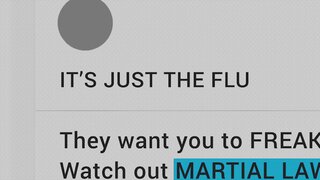Create a free profile to get unlimited access to exclusive videos, breaking news, sweepstakes, and more!
Dark Web Exposed: The Hidden Threat That's Sweeping Across The U.S. In The Era Of COVID-19
The COVID-19 pandemic is still raging through the United States, taking lives and filling up hospital beds, and but another insidious threat known by some as the "infodemic" — or rampant spread of misinformation — has compounded the crisis.
As the coronavirus pandemic continues to plague the country, there’s another insidious threat taking hold across the U.S., with damaging effects to our communities.
Some experts have called it an "infodemic," or the rapid spread of false and misleading information as the public tries to make sense of COVID-19 and what it means for daily life.
Oxygen.com’s “Dark Web Exposed” explores the significant harms associated with misinformation in the era of COVID-19 and who is often behind the damaging messages.
“Everyone knows what a pandemic is right now: a virus can spread across the world and make people sick,” Fadi Quran, campaign director for AVAAZ, an online civic movement urging communities to take action on a range of issues, said in the series. “There’s another threat, this infodemic — false and misleading information that is traveling as fast as the virus, infecting people’s minds and making individuals follow harmful advice.”
According to Quran, more than 60 percent of Americans believe at least one piece of misinformation they saw on social media.
These messages often spread quickly — unchecked — across social media platforms, including Facebook and Twitter.
Quran cited one example that falsely claimed to be from the Stanford Health Institute that reported if a person could hold their breath for 10 seconds, they could not have COVID-19.
"That post has reached millions of views and has been watched tens of thousands of times," he said. "I imagine a woman sees this, holds her breath for 10 seconds and goes to visit her grandmother and gets her mother sick at a nursing home. You could see the dominos of that."
Another falsely claimed that people with black skin were immune to the virus.
Misinformation has also already begun to spread about the two vaccines approved in December to treat COVID-19.
“The fact that it's new, the fact that it's uncertain, the fact that your local doctor and pharmacist can't say to you, 'I've done this for 10 years now,' or, 'We've done the flu vaccine forever' — it's going to add to the potential for misleading and downright malicious material online,” Paul Barrett, deputy director of the NYU Stern Center for Business and Human Rights and a disinformation researcher told Politico.
The vaccines are particularly susceptible to misleading claims because data about them still remains limited and the approval has come at a time when levels of distrust in the government remain high in some populations.
To gauge how quickly misinformation can permeate a community, AVAAZ identified in an April study 100 pieces of misinformation they said could result in public harm and found that the messages were shared on Facebook over 1.7 million times and viewed an estimated 117 million times.
Studies are finding Americans are even more susceptible to misinformation now, due to the stress and anxiety associated with the pervasive pandemic.
“This is partly an issue of scale,” Helen Kapstein, a professor and mass hysteria expert told "Dark Web Exposed." “The nature of the pandemic is that it’s everywhere and that’s practically unfathomable. We’re so much more vulnerable in a time like this than we would normally be because we’re all legitimately very scared and therefore we’re all more prone to buying into ideas that we might otherwise be a little bit more immune to.”
Since the pandemic began, The New York Times reports that there have been more than 23 million cases of COVID-19 in the United States and more than 380,000 deaths.
Quran said people often assume misinformation is just “ignorant people posting ignorant stuff” but the reality is that these messages are often tailored by those “with a specific goal meant to harm” a subset of people—whether it’s being planted by a political faction or another country that could benefit from creating chaos in the United States.
“A lot of the misinformation that we’ve seen starts with a kernel of truth and then has a whole bunch of lies built on top of that and that’s a real issue because it looks credible when you first see it,” Zoe Schiffer, a writer with The Interface, a newsletter from The Verge on social media and democracy, said in the series.
Whatever the motivation behind the misinformation, the result can have damaging effects for those who believe the false narratives—particularly as coronavirus continues to rage across the country.
“The communities that believe misinformation were 25% less likely to follow basic health advice such as washing your hands and wearing a mask and so forth, and the impact that has on the pandemic could be exponential,” Quran said.






























